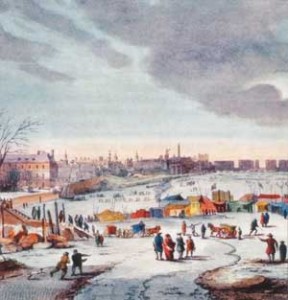
Frost Fair on the River Thames near
the Temple Stairs in 1683-84.
Engraving after a drawing by Jan Wijck.
Source: Wikimedia Commons
For many historical climatologists cold, wet and stormy weather worsened life for most European people and harmed the economy during the early modern period. Warmth on the other hand is generally regarded as a beneficial thing but too much of it is also harmful. This all seems to make sense if one ignores the Dutch economic miracle which transformed a small piece of land on the edge of Europe into the first modern economy just as the Little Ice Age entered its coldest phase. How is this possible in the face of climatic stress?
This is one of that questions that Dagomar Degroot, a PhD Candidate in environmental history at York University in Toronto, Canada, addresses on this episode of the podcast. His research explores the issue of how the changing climate of the Little Ice Age influenced the cultural, military and economic histories of the Dutch Republic during the early modern period. In addition, Dagomar will discuss the pitfalls of determinism and indeterminism in historical climatology, the sources available to historian’s researching climate and the relevance of historical climate research for present day debates about global warming and climate change. Finally, he will talk about the importance of blogging for the historical profession as a tool to communicate research outcomes to a wider audience.
Relevant websites
HistoricalClimatology.com
Climate History Network
CLIWOC
Further reading
Dagomar Degroot, “Does tree ring data reflect global cooling?“, HistoricalClimatology.com, 9 July 2012.
David D. Zhang et.al., “The causality analysis of climate change and large-scale human crisis“, PNAS, October 18, 2011 vol. 108 no. 42, pp. 17296-17301.
Related podcasts
- Climatologist Dennis Wheeler discussing the use of ship logs for historical climate reconstruction on episode 7 of Exploring environmental History.
- Christian Pfister on the cultural memory of extreme weather events, episode 29 of Exploring environmental History.
Music credits
“Where You Are Now” by Zapac
Available from ccMixter
“Flowing Water” by Pitx
Available from ccMixter


Recent Comments